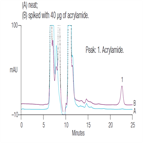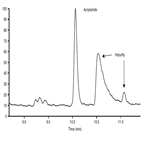Find methods for your needs
Refine by Feature
Displaying 1-3 of 3 results for Tag: Acrylamide
AN358: Extraction and Cleanup of Acrylamide in Complex Matrices Using Accelerated Solvent Extraction Followed by Liquid Chromatography Tandem Mass Spectrometry (LC-MS/MS)
Instrument Type: Automated Sample PrepAcrylamide is formed during the cooking process of certain plant-based foods which are rich in carbohydrates and low in protein. Specifically, it forms when asparagine reacts with sugars such as glucose at high temperatures. Acrylamide is a known carcinogen in animals. Accelerated solvent extraction is an excellent technique for extraction of acrylamide from various fried food products. This application note describes a new accelerated solvent extraction method that combines the extraction of low-levels of acrylamide from coffee and chocolate with an in-cell, solid-phase cleanup step.
AN409: Fast Determination of Acrylamide in Food Samples Using Accelerated Solvent extraction Followed by Ion Chromatography with UV or MS Detection
Instrument Type: ICThis fast determination of acrylamide method consists of a fast, automated extraction method, which finish extraction in 20 min using accelerated solvent extraction using pure water, water with 10 mM formic acid, or acetonitrile. The extracts were then directly analyzed by ion chromatography (IC) using a 4-mm ion-exclusion column and both UV and MS detection. Results were obtained for acrylamide in french fries, potato chips, and crisp bread.
Sensitive determination of acrylamide in potato chips using a Thermo Scientific TraceGOLD TG-Wax MS GC column
Instrument Type: GCMSAn extraction of acrylamide from potato chips was performed using Thermo Scientific HyperSep Hypercarb solid phase extraction (SPE) with quantitation of acrylamide performed using a Thermo Scientific GC-MS with a Thermo Scientific TraceGOLD TG-WaxMS GC column. A standard addition calibration curve was used to estimate the level of acrylamide in potato chips and found to be 450 µg/kg.



